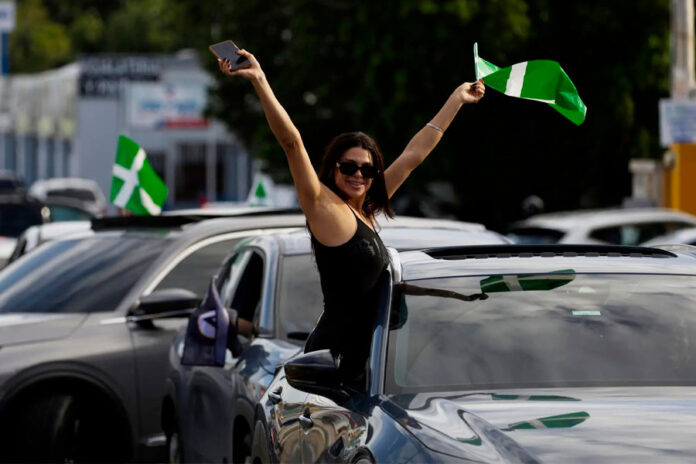
Puerto Ricans en la isla can’t vote in the U.S. presidential elections – but voters there have a potentially historic election of their own next month.
Boricuas will take to the polls on November 5 to vote for its next governor, resident commissioner and various local and legislative offices. Unlike in years past, when the Pro-Statehood Partido Nuevo Progresista (PNP) or the pro-status quo Partido Popular Democratico (PPD) dominated election victories, there are two left-leaning parties growing in popularity, which are running on an anti-corruption platform – and pushing for self-determination and independence.
An alliance formed by the Partido Independista Puertorriqueño (PIP) and Movimiento Victoria Cuidadana (MVC) has paved the way for respected PIP leader Juan Dalmau to run for governor with MVC support, while the PIP is endorsing MVC candidates Ana Irma Rivera Lassen, who is running for resident commissioner – the colony’s non-voting member of the U.S. Congress – and Manuel Natal Albelo, who is running for mayor of San Juan.
Less than 25 years ago, PIP gubernatorial candidates were drawing just three percent of the vote; the MVC did not even exist. Yet today, according to the latest polling, Dalmau is running a too-close-to-call race against the PNP candidate and Donald J. Trump supporter Jenniffer Gonzalez, who also has to compete for conservative votes from a Christian Right party called Proyecto Dignidad.
So, what has changed the landscape?
Puerto Rican Political History – Before and After Hurricane Maria
Starting with Pedro Rosello’s administration in the early 1990s, every sitting governor – both PNP and PPD — has been entangled in a corruption scandal. Furthermore, since the mid-2000s, Puerto Rico has been in a recession yet PNP and PPD leaders has offered mostly austerity measures in the form of privatization as a solution. In 2016, then-PPD Governor Alejando Garcia Padilla announced the government could not make a debt payment, which paved the way to the PROMESA Bill later that year. The Financial Oversight and Management Board of Puerto Rico, better known simply as “La Junta,” recommended huge budget cuts which led to massive layoffs in essential services like electricity, water, education, and medical services.
Then in 2017, Hurricane Maria ravaged the archipelago. The ineffectiveness and poor response from both Puerto Rican and U.S. government leadership, namely then-PNP Governor Ricky Rosello’s administration and the Federal Emergency Management Administration (FEMA), led to thousands dead and widespread disillusionment from Puerto Ricans, too many of whom felt pushed out and migrated to the U.S. Then in 2019, yet another public scandal directed at Governor Rosello led to his resignation. As the archipelago’s population shrank, Puerto Ricans younger than 25 years old gained a larger share of the workforce. As generations of PNP and PPD voters either pass away, move to the U.S. or do not feel loyal to the PNP or PPD, this younger-leaning voter base either want political leaders to focus on issues instead of just political status or no longer are convinced statehood or the status quo can improve Puerto Rico’s dire situation. Even if the pro-independence Dalmau fails to win this election, the younger generations who lean towards political change may grow more powerful in future elections and continue to be influenced by outside forces in this new, social media-driven, multipolar world.
As the elections approach, Boricua voters will consider lots of issues – the economy, government corruption, ending blackouts, healthcare, federal funding, climate issues, education, privatization of beaches and public land, feminicides, abortion access, LGBTQ rights and so on – but one thing is for certain:
The two-party dominance in Puerto Rico is dying – and the statehood and status quo movements may die with it.
Michael Collazo is CEO of Dahday, LLC. Fermin Morales is a retired union electrician for IBEW Local 98 and currently residing in Puerto Rico. Both are members of Philly Boricuas.






